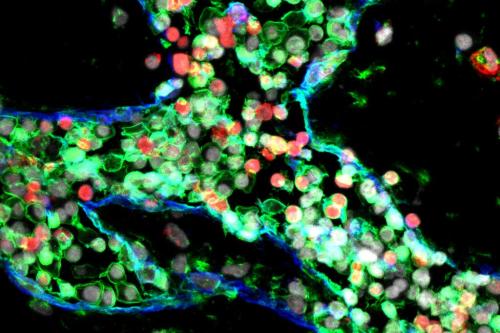
UCLA researchers receive prestigious CIRM tools and technology award
Two scientists from the Eli and Edythe Broad Center of Regenerative Medicine and Stem Cell Research at UCLA have received a California Institute of Regenerative Medicine (CIRM) Tools and Technology Award that will forward revolutionary stem cell medicine. The UCLA researchers were among only 20 scientists nationwide to receive the Tools and Technologies Award, the most of any institution represented.
Recipients receiving awards for their respective projects included Dr. James Dunn, professor of bioengineering and surgery, for his research investigating skin-derived precursor stem cells for the treatment of enteric neuromuscular dysfunction, and Dr. Hanna Mikkola, associate professor of molecular, cell and developmental biology, for her work creating a suite of engineered human pluripotent stem cell lines to facilitate the generation of patient specific hematopoietic stem cells.
UCLA Broad Stem Cell Research Center Director Owen Witte said, “We are very grateful for CIRM’s support of these potentially groundbreaking projects intended to overcome significant bottlenecks in driving stem cell therapies to the clinic.”
The CIRM Tools and Technologies initiative is designed specifically to support research that can address regenerative medicine’s unique translational challenges. The award seeks to facilitate the creation, design and testing of broadly applicable novel tools and technologies for addressing translational bottlenecks to stem cell therapies.
Dr. James Dunn: Unlocking the Secrets of Neuromuscular Dysfunction
Dr. Dunn’s cutting-edge work focuses on assessing the therapeutic potential of skin-derived stem cells to treat neuromuscular gastrointestinal diseases. CIRM reviewers noted that, “if successfully completed, the project would likely have a major impact upon the field.” His lab will develop a model of intestinal neuromuscular dysfunction that is amenable to stem cell transplantation.
Dunn’s novel approach to treat these patients will use stem cells reprogrammed from the patient’s own skin (induced pluripotent stem cells) to generate the neural system to correct the intestinal dysfunction. Dunn and his team hope the research will result in a clinical trial using patient specific induced pluripotent stem cells and provide a critical step toward an improved therapeutic approach and to treat intestinal neuromuscular dysfunction.
Dr. Dunn’s research was additionally supported by the National Institutes of Health and Sun West Company.
Dr. Hanna Mikkola: Identifying Milestones in Human Stem Cell Development
Dr. Hanna Mikkola is pioneering new tools that address major bottlenecks that have prevented the generation of blood forming stem cells in the laboratory for therapeutic use. In collaboration with Dr. Andrew Elefanty’s team from the Australian Murdoch Childrens Research Institute (who will be funded by a CIRM Collaborative Funding Partner, the Australian National Health and Medical Research Council), Dr. Mikkola’s team is developing new human embryonic stem cell reporter lines that can be used to monitor key milestones in blood stem cell development. These lines will serve as tools to identify factor combinations to improve the differentiation of human stem cells to functional and transplantable blood stem cells for therapeutic use. If successful, the project could result in unlimited sources of HLA-matched or patient specific blood stem cells that can be used for treating many serious blood diseases, including leukemias and inherited immune-deficiencies or anemias.
By creating an unlimited source of patient specific blood stem cells, Mikkola’s research could address the serious limited availability of suitable bone marrow donors for individuals from mixed ethnic backgrounds. She will also develop innovative technology for labeling and monitoring the transplanted cells by advanced imaging such as PET scans. CIRM reviewers noted that, “The bottleneck addressed by this application is cost efficient production of stem [cell] therapies and improving cell tracking of engrafted cells.”
Dr. Mikkola’s research was additionally supported by the National Institutes of Health, Leukemia Lymphoma Society, and by philanthropy to the UCLA Broad Stem Cell Research Center.
